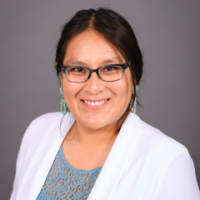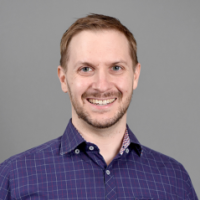Bioethics Breakfast Club Provides Food for Thought (and Bagels) to the School of Life Sciences
By: Matt Tontonoz
People start filing into the classroom at around 8:55 am, beckoned by the promise of hearty intellectual conversation and free bagels and coffee. Today’s installation of Bioethics Breakfast Club is devoted to the topic of “Sequencing Global Eukaryotic Biodiversity – Social and Ethical Considerations.” The speakers are ASU faculty members Krystal Tsosie and Beckett Sterner.
Sterner, a philosopher of science specializing in topics related to biodiversity and evolution, and Tsosie, a Diné/Navajo geneticist-bioethicist who advocates for Indigenous genomic data sovereignty, have come to discuss a contemporary initiative called the Earth Biogenome Project. The aim of that Project is to sequence, catalog, and characterize the genomes of all of Earth’s eukaryotic biodiversity over a period of ten years. The overall goal is to put genomic sequencing in the service of conservation, on the theory that you can’t conserve what you don’t know about.
In the words of Mark Blaxter, one of the Project’s founders, the Earth Biogenome Project represents “a quest for omniscience in biology—a quest to understand nature by characterizing its very essence, the DNA that encodes the basic blueprint of every species on Earth” (Blaxter et al. 2022, PNAS). He and others have likened the Project to a “moonshot for biology.”
As with any large international project that involves a significant financial investment and the potential for profit and exploitation, there are ethical, legal, and social issues that must be addressed to ensure that the Project benefits all people and nations equitably.
Dr. Sterner frames the ethical and social issues with a series of questions. He asks the audience to ponder:
- Whose quest is it?
- Why is DNA the right goal?
- Who else benefits, loses, or becomes collateral damage?
- What social systems are taken for granted?
Dr. Sterner and Dr. Tsosie, along with several colleagues, recently published* a framework for considering ethical and social issues at every stage of the research data lifecycle. Their framework puts an emphasis on partnering with Indigenous peoples and local communities in sequencing eukaryotic diversity.
In her part of the discussion, Dr. Tsosie notes that Indigenous people make up less than 5% of the world’s population yet protect 80% of the world’s biodiversity. The potential is great, she says, for genomic discoveries to co-opt Indigenous knowledges or disenfranchise Indigenous peoples, who are often last to benefit and are least protected from intellectual property claims.
In suggesting ways to prevent such injustices, Dr. Tsosie refers to efforts such as the Nagoya Protocol, which is a legal framework under the Convention on Biological Diversity that formalizes fair and equitable sharing of benefits arising from biological diversity. She also mentions several efforts that she and colleagues have spearheaded to help protect Indigenous genomic data sovereignty.
Recently, there have been discussions about involving ASU in the Earth Biogenome Project. In anticipation of that day, Dr. Tsosie asks the audience to consider, “What would it look like for ASU to do the EBP the right way—e.g., following ASU’s values and charter? How would this look in consideration to Arizona Tribal Nations?”
People are still raising their hands with questions when 10 o’clock rolls around and the session is over.
About Bioethics Breakfast Club
The brain child of Karin Ellison, Clinical Professor in Biology and Society in the School of Life Sciences at ASU, Bioethics Breakfast Club is meant to provide an informal opportunity for members of the ASU community to discuss ethical issues at the intersection of life sciences and society. The event occurs several times a semester, on a Wednesday at 9 am.
Past Bioethics Breakfast Clubs have included topics such as:
- Capitalism and Conservation
- The Good Life for Dogs?
- The Science and Ethics of Organoids
- Monkeypox vaccination
Upcoming next semester are sessions devoted to:
- Life in Space
- The Consequences of Thinking of Sex as Binary
- The Deliberate Extinction of Mosquitoes
- The Outcomes of “High-Impact” Research
Bioethics Breakfast Club is free and open to all members of the ASU community. Reservations are encouraged.
* Mc Cartney, A.M., Head, M.A., Tsosie, K.S. et al. Indigenous peoples and local communities as partners in the sequencing of global eukaryotic biodiversity. npj biodiversity 2, 8 (2023). https://doi.org/10.1038/s44185-023-00013-7

